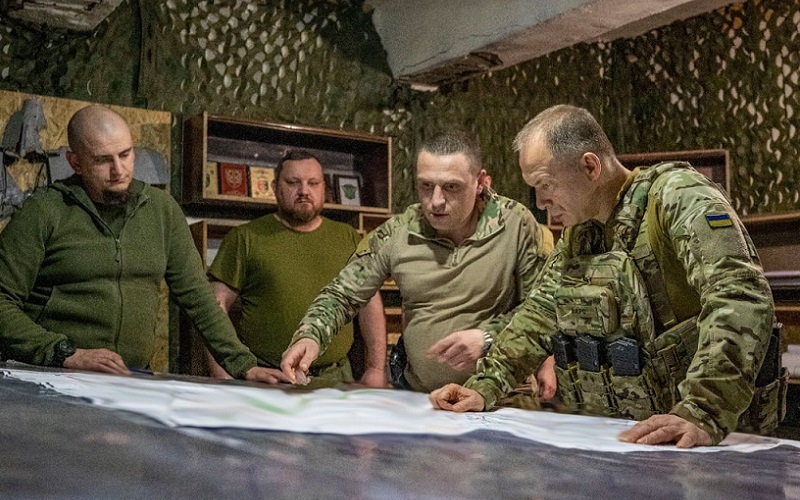Despite Vladimir Zelensky’s Pleas, His Country Was Not Allowed to Fire Long-Range Missiles
By Misto Brazil – DF
In the ongoing conflict between Ukraine and Russia, the stakes have never been higher. As winter approaches, the need for decisive action and support for Ukraine has become increasingly urgent. Ukrainian President Vladimir Zelensky has made fervent appeals for long-range missile capabilities to bolster his country’s defense against Russian aggression. However, despite these pleas, key Western allies, including the United Kingdom and the United States, have refrained from granting Ukraine the autonomy to use these powerful weapons against targets within Russia.
The Call for Courage from Western Allies
During a recent event hosted by the British Labor Party, UK Foreign Secretary David Lammy emphasized the necessity for Western allies to demonstrate "courage" in their support for Ukraine. Speaking alongside Valery Zaluzhny, a former commander of the Ukrainian armed forces now serving as Ukraine’s ambassador to the UK, Lammy highlighted the critical moment facing the West. He stated, “This is an important moment of nerve, courage, patience, and bravery on behalf of allies standing with Ukraine.”
While Lammy refrained from discussing operational specifics, he confirmed that discussions among allies are ongoing regarding how best to support Ukraine as the harsh winter looms. The urgency of these discussions cannot be overstated, as the conflict continues to evolve and escalate.
The Long-Range Missile Dilemma
Despite receiving advanced weaponry, including British Storm Shadow missiles and American ATACMS, Ukraine has not been granted the authority to deploy these systems against Russian targets. This limitation stems from the operational control that supplier nations retain over the missiles. Only the countries that manufacture these weapons can input flight details and satellite information necessary for targeting, effectively allowing them to dictate where and how these missiles can be used.
This situation has left Ukraine in a precarious position. While the provision of advanced weaponry is a significant boost, the inability to independently utilize these systems against Russian positions limits their strategic options. Zelensky’s calls for greater autonomy in using long-range missiles underscore the frustration felt by Ukraine’s leadership as they seek to defend their sovereignty.
The Political Landscape
The discussions surrounding the use of long-range missiles have not gone unnoticed at the highest levels of government. U.S. President Joe Biden and British Prime Minister Keir Starmer have engaged in ongoing debates regarding the implications of allowing Ukraine to strike targets within Russia. As the 79th United Nations General Assembly convenes this week in New York, the international community is watching closely for any developments that may arise from these discussions.
Russian President Vladimir Putin has issued stern warnings regarding the potential use of Western weapons in the conflict. He has claimed that such actions would signify direct involvement from NATO, which could escalate the situation dramatically. The prospect of NATO’s involvement raises the stakes for all parties, as it could lead to a broader conflict with unpredictable consequences.
The Implications of Inaction
As winter approaches, the urgency for decisive action becomes increasingly apparent. The ongoing conflict has already resulted in significant humanitarian crises, and the prospect of a prolonged stalemate could exacerbate these challenges. The inability to utilize long-range missiles effectively may hinder Ukraine’s ability to mount a robust defense against Russian advances, potentially leading to further territorial losses.
Moreover, the geopolitical ramifications of this situation extend beyond the borders of Ukraine. The West’s hesitance to fully support Ukraine’s military capabilities may embolden Russia, sending a message that aggressive actions can be met with limited consequences. Conversely, a strong show of support for Ukraine could reinforce the resolve of NATO allies and deter further Russian aggression.
Conclusion
The situation in Ukraine remains fluid and complex, with the balance of power hanging in the balance. Despite President Zelensky’s impassioned pleas for long-range missile capabilities, the response from Western allies has been cautious, reflecting the intricate web of geopolitical considerations at play. As discussions continue among key leaders, the world watches closely, hoping for a resolution that prioritizes peace, stability, and the protection of Ukraine’s sovereignty. The coming weeks will be critical in determining the future trajectory of this conflict and the role of international allies in supporting Ukraine’s fight for freedom.
